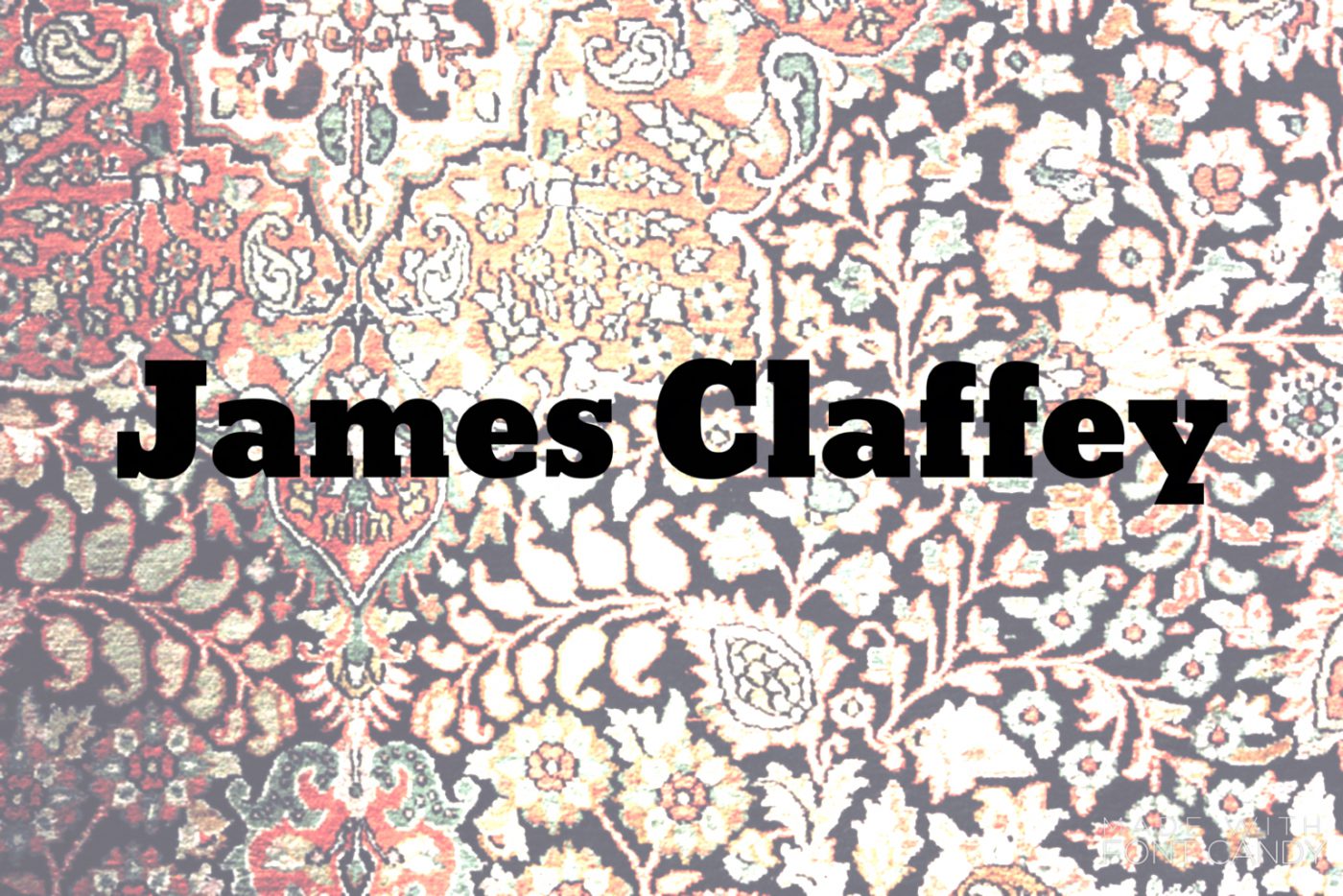
Sometimes writers just click. Perhaps it’s a common artistic sensibility, maybe one writer impresses the other with a ballsy technique, or shows the other writer a new way to approach an old narrative problem. All these things are true for me when it comes to James Claffey. I remember seeing one of his flash fiction pieces in Fictionaut and thinking, Wow, beautiful! And when I think beautiful, I don’t think of verbal dexterity or poetic intentions, I think of simple, gut-wrenching prose that carries more weight than you can see on the page. I was super-excited that James agreed to have this conversation with me. My motives were selfish. I wanted to pick his brain and see what inspired his work, and boy, did he deliver.
James hails from County Westmeath, Ireland, and lives on an avocado ranch in Carpinteria, CA. His work has appeared in the New Orleans Review, Word Riot, Metazen, Necessary Fiction, FWriction and many other places. His short fiction collection will be published this fall by Press 53.
New writing at: The Bicycle Review Pure Slush Metazen Blue Fifth Review
Website at: www.jamesclaffey.com
You’re a prolific writer, so I’ll start with a two-part process question. What are your working habits and how do you begin a story?
CLAFFEY
Thanks, Gessy. Working habits are difficult to name, particularly with a sixteen-month-old in the house. Suffice to say, I don’t write at home for the most part, and get most of my writing done when I’m on my lunch break from work. Luckily, writing mainly in the short form I manage to find enough time to bang out a story pretty quickly and revisions are limited and minimal. I’ve got two manuscripts on the go right now and one is done with major edits. The other is in need of work and when I can I sit down with the MS, I work a section at a time. I guess my habit is to work in short bursts of energetic creativity and the long streaks of non-writing time. In the past I’ve been able to sneak away for a week here and there and sequester myself with paper and typewriter and get a rough draft out, but with our daughter taking our attention I haven’t had that happen for a few years. As for beginning a story, I start with an idea, or an image, and grasp a small thread that I end up following wherever it takes me. Sometimes I’ll see something and a memory will be triggered and I’m off. Color, a smell, sometimes a phrase, will trigger the writing and the process is fairly plastic in terms of where the piece goes from there.
Much of your work features a distinct, male voice that is both lyrical and prescient. Two elements that should weigh down the voice and make it “overly literary,” but in your stories, the voice remains corporeal and engaging. Is voice something you feel at ease creating or is it something you work hard to achieve?
CLAFFEY
I tried to write in a “voice” when I wrote my MFA thesis (a novel), and truthfully, the voice rang hollow, rang untrue, and the whole thing hung together like rags on a scarecrow. When I left Louisiana and came back to our old place in Carpinteria, I started writing short pieces in the voice of an imagined young boy for the most part, and somehow those stories contained less “truth” than my novel, yet the voice felt right, as if I had found the right pitch to use. It’s not for everyone, and there are places that’d never publish those pieces (unnamed of course), and that’s okay, I’ve learned the lesson over the past eighteen months to hold back and not submit to so many places, and now I only submit stories to places that I know my work will be best represented, like Pithead Chapel and Cease, Cows, two relatively new players, but with strong editorial leadership and wonderful presentation. Look how I digressed! Anyway, to the second part of the question, the voice is something I fall into once I write a few sentences, like slipping on an old pair of jeans, I can tell I’m on the right track, and the words flow.
You mention how “the words flow,” how important is sound in your prose?
CLAFFEY
Critical. Words convey meaning, and the sound of the words convey something about the writing that’s deeper than meaning, more like the chords of a particular melody. Voice and sound are intertwined for me, and my subliminal steers the writing towards the confluence of the two streams. I’m a huge fan of writing that “speaks” to me through the sound of the words. I’ve always loved the poetry of Gerard Manley Hopkins and Dylan Thomas, and the way James Joyce puts music in his writing, too. I’m a long way from any of these writers, but the writing I attempt to do has to sound right to the ear when I read it aloud, or else it’s not working for me. I wish I was more aware of this need, and many times I don’t actually focus on making the writing sound the way I want it, and instead let it flow the way it comes out.
You have a story in the current issue of The Bicycle Review called effigies. What I find striking about this story is your use of time. The narrative never shifts from the present tense. This technique gives the story a sense of taking place both in the present and in the past. In some ways, the temporal juxtaposed with the effigies of saints, and earthly life pitted against the sacred. Can you tell us more about this story and why you chose to write it in the present tense?
CLAFFEY
Thanks, Gessy. And that’s a good question as to time, because temporality is a major part of my writing, and particularly so right now having just turned fifty. There’s a constant friction between the sacred and the everyday that invades many of my stories, and this jutting against the church is perhaps my way of figuring out my relationship to the Catholic faith, which these days is a difficult relationship for me. In terms of past and present, I write in the present tense for immediacy, to bring the reader into the action, and also because using present tense allows me to enter the world of the characters and poke around in their business in a direct manner. I find the present tense gives me the latitude to allow the story to open up in ways in might not if I were to write from a past tense point-of-view. Situating the narrative in the present tense forces me to give in to the writing, to let the narrative flow wherever it might need to go, rather than a past tense where the feeling might be that I already know the outcome and am writing for that destination. Maybe too it’s a way for me to bring the writing to life in a more direct manner, to live in the moment of the action and see that world I remember so vividly reawaken on the page. The story in the Bicycle Review is a new creation, and very much in its generative stage, but the tense will stay the same. Sometimes I feel that the present tense can be a turn-off for agents/editors for some reason. I don’t know if they prefer the old style third person past tense, but I’m done writing for “them” and focused more on writing for the story itself and to hell with the establishment.
I know your first book, Blood a Cold Blue will be published this fall; can you give us a brief synopsis of the book and what else we can expect to read from you in the future?
CLAFFEY
Well, Blood a Cold Blue is a collection of stories I’ve published in various places over the last three years, and there are some unpublished stories in there. Many of the pieces are flash fiction/prose poems, and represent the major shift my writing took when I left grad school and found myself out there in the world without that built-in community of writers to fall back on. The collection only has a couple of my Irish childhood stories, and is definitely more experimental writing than anything I did in graduate school.
As for the future, Thrice Publishing will be bringing out my novel, to date unnamed, which is a coming of age story about a young boy trying to come to terms with his emotionally distant father, and is based in Ireland in the 1970s and ’80s. Some of the manuscript has been published in various places as short fiction, but Thrice will be bringing out a book that has a clearly defined narrative arc and hopefully a few surprises for the reader. I’m excited to work with RW Spryszak and Dave Simmer, because the job they’ve done with Thrice Fiction Magazine is so amazing, I can’t wait to see how they bring my novel into the world. I’ve also started a new project, the opening section of which appears at the Bicycle Review, as we talked about in the last question. Thanks so much for indulging me here, Gessy.
Thank you, James!




4 responses to “James Claffey – Conversation No. 4”
Such a candid interview by one of my favorite writers.
thanks susan!
Deep questions evoke deep answers. Great interview. Like a Tiny Desk Concert on NPR ~ Tiny Master Class!
cheers michael!